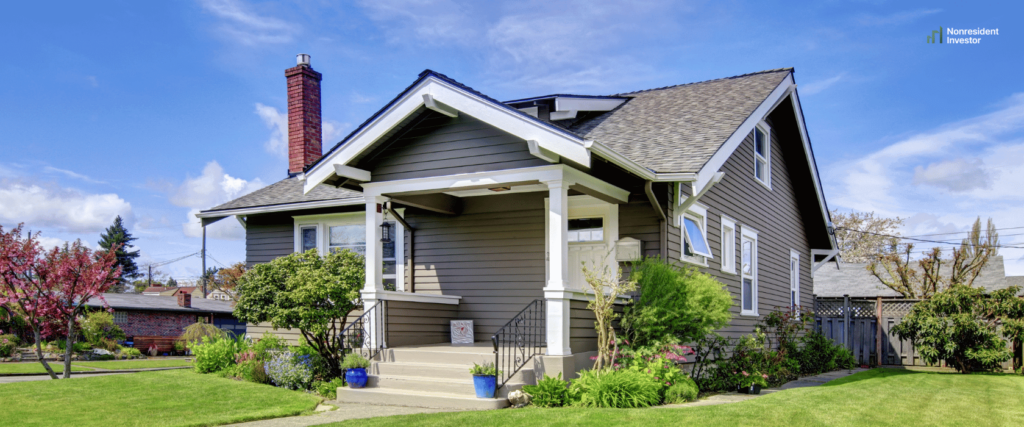If you’ve read one of my first posts on how I started the NRI brand, you already know why I got into US real estate investing and bought an investment property in the USA. I needed to find a place to invest the profits from my IT company, Addria. In this article you will learn 10 things you should know before investing in US Real Estate as a foreigner.
I chose America as my target market because I already knew how the market worked and had many connections there from my past business ventures.
Despite that, my first purchase didn’t go as smoothly as I had hoped.
I made many mistakes on my journey to buying my first two duplexes in the US. However, making these mistakes helped me grow both as an entrepreneur and an investor.
So if you’re thinking about becoming a nonresident investor yourself, I have some advice for you. In this article, I’ll share the ten things I wish someone had told me before I got into real estate investing as a foreigner.
10 Things I Wish I Knew Before I Started Investing in US Real Estate as Nonresident Investor
After going through a lot of trial and error to get to where I was, I realized how much time, effort, and money I could have saved if I had someone to help me.
But just because I had to do it the hard way doesn’t mean you should.

Here are the ten pieces of advice (from personal experience) I believe can be game-changers for aspiring nonresident investors:
1. Knowledge Is Everything (The More You Learn, the More You Earn)
Knowledge is power. And yes, as cliche as it may sound, it really is. That is true for most things in life, but particularly for real estate investing.
It took me several investments before I became comfortable with the process. Optimizing my ROI was also pure trial and error at first. Only after being a nonresident investor for over a few years did I find the best ways to make the most out of each purchase.
In other words, the more experience I gained, the better my ROI was.
And that’s completely normal.
No matter how prepared you think you are, you’ll never be truly ready. So the best thing you can do is pull the trigger and learn from your mistakes. After all, as a nonresident investor, you need to think about many things, including:
- How real estate investing works;
- How to build a reliable team;
- Identifying the best deals;
- Learning how ROI works and how to optimize it;
- Knowing when the time is right to make a purchase.
It’s unlikely you’ll nail it all on your first try — and that’s OK. Just don’t get discouraged. After all, as Robert Kiyosaki put it:
“You will make some mistakes but, if you learn from those mistakes, those mistakes will become wisdom, and wisdom is essential to becoming wealthy.”
2. Real Estate is Surprisingly Affordable in Some Places in America
Most people in Europe (and other parts of the world) don’t know that real estate is surprisingly affordable in some places in America. In some states, you can find well-kept properties for as little as $100,000!
Just as an example, here are the top five states with the cheapest real estate (according to data from Zillow):
- West Virginia
- Mississippi
- Arkansas
- Oklahoma
- Iowa
- Wisconsin
You can find houses for as low as $50,000 in more remote locations in these states. If I had known that earlier, I would have gotten into real estate investing sooner myself.
Real estate is cheap in these regions for a reason. America, despite being so large, has a low population density. That means it has a lot of potential for expansion.
So if you’re looking to get into real estate investing, I advise you to look for a deal in smaller towns and communities with high potential.

3. The Sooner You Start, the Better
When investing in real estate, you are creating steady cash flow through passive income. And that means ROI is nothing but a waiting game.
So the sooner you start building that cash flow, the more ROI you’ll generate over time.
Although it’s ideal to start investing as early as possible, it’s never too late. So whether you’re in your 20s or are way past 50, there is still time to become a nonresident investor. All you need to do is make the first move.
As I like to say, the best time to start investing was yesterday, but the second-best time to start is now.
4. The US Is Incredibly Welcoming to Foreign Real Estate Investors
Contrary to what many may think, the US is incredibly welcoming to foreign real estate investors. The reason is simple — more than 47% of American land is uninhabited. Opening the country up to foreign investors proved to be the most efficient way of urbanizing more land.
Only in 2022, nonresident investors spent over $59 billion on over 100,000 properties in the US. That makes them some of the top contributors toward urbanization in the country. Most of these buyers came from Canada, Mexico, and China, but there are many others from all over the world.
So regardless of where you come from, there is room for you to invest in US real estate. In fact, some of America’s largest and most successful real estate investors are foreigners. The prime example would be Sun Hongbin, a fellow nonresident investor whose net worth is estimated at $7 billion.
So let him be your motivation to build a better future for yourself through real estate investing. He sure was mine!

5. Investing in US Real Estate Requires Building an All-Star Team
One of the most valuable things I learned on my journey as a nonresident investor is that it is a team game. In other words, connections are everything.
The broader your network of business partners is, the easier it gets. In fact, I’d say that finding the right consultant, lawyer, accountant, property management agency, and other professionals you’ll need help from is the hardest part.
For me, it was a lot of trial and error. It took me several investments to find and build the right team of people I could trust. But it only went uphill from there.
So if you’re planning to become a nonresident investor, I’d advise getting a mentor to help you find the right partners. That way, you can save time, money, and stress vetting, testing, and often firing various contractors.
If you’re unsure who to turn to, I’d be glad to help you. I’ve been through the entire process myself, and I already have a team with dozens of years of experience in the industry that can help guide you through the entire investment process. So why not hop on a short discovery call and tell me more about your real estate investing goals?
6. You Must Know How to Recognize a Good Deal
One golden rule of investing is that you need to know how to find a good deal. This step is the first and the most crucial one for every purchase. After all, if you choose poorly, no amount of skill, damage control, or revenue optimization will save your investment.
However, learning how to do that is the tricky part. You need a lot of knowledge and experience to filter out bad actors from legitimate and valuable deals.
Being a skilled negotiator and having a nose for good deals (like many entrepreneurs do) will be of great help. But even if you lack these skills, you can still find lucrative investments with a bit of research and lots of experience.
Either way, you will have to throw yourself into the fray to improve.
To be perfectly honest, my first deal wasn’t great. However, after a few more investments, I kept improving until I finally cracked the code and can now reliably identify the best offers with the least amount of research.
So don’t get discouraged if your first deal doesn’t go well. Just stay focused on long-term success — you will get better, and it will happen faster than you think!
7. You Need to Invest in the Right City and Neighborhood for the Highest ROI
If your goal for investing in US real estate is to generate steady cash flow through passive income, picking the right location is essential for achieving maximum ROI.
When researching the best cities to buy property in, you should always look at the city’s economy and population growth. If the town is growing, so is the demand for housing. The opposite applies if the town is losing residents.
After you pick a city to invest in, you next need to identify the right neighborhood. Whenever I go scouting for a deal, I look for the following things in a neighborhood:
- What kind of community it has;
- How peaceful it is;
- What types of amenities it has nearby;
- How expensive property is there;
- Whether it’s an up-and-coming area (still in development).
But if you can’t visit the neighborhood in person, I suggest you contact a local property inspector or property management agency for advice. Although their services will cost you, they should be well-acquainted with the town and should be able to provide you with sound advice.
At the end of the day, it’s better to invest some extra funds to ensure you pick the right location than end up losing on potential ROI if you choose poorly.

8. The US Has a Housing Shortage
Even though the US is one of the wealthiest countries in the world, it has a massive housing shortage. The country is in dire need of more than 3.8 million homes, especially for low-income residents. To top it all off, existing properties are around 100 years old on average.
The US also has incredibly high costs of labor. That means buying and renovating a house is significantly cheaper than building one. To put things into perspective, a house you can buy for $60,000 can cost up to $200,000 to build from scratch!
So if you’re looking to maximize ROI from real estate investing, buying property in the US is perfect. There are millions of people there without a roof over their heads, meaning that the demand for real estate is off the charts. That guarantees you’ll be able to get good rent prices from tenants.
9. Nonresident Investors Enjoy Various Tax Benefits
Due to the abovementioned housing shortage in the US, its government does its best to motivate investors. The way it does that is through various tax benefits.
A few of the most notable ones are:
- Lower Capital Gains — This benefit entails paying lower capital gains taxes when investing in real estate long-term. However, it doesn’t apply to people doing house flipping.
- Depreciation — This benefit lets you claim depreciation for your investment over 27.5 years (for residential real estate).
- 1031 Exchanges — This benefit allows investors to avoid paying taxes for selling their properties as long as they invest that money into another, more valuable property.
- Nonresident Aliens Pay Lower Taxes Than Americans — Nonresident investors pay income tax in the country they live in, which most likely has lower tax rates than the US. The only taxes they pay in America are on US-sourced income, which, for nonresidents, is only their passive income (from real estate).
Besides these advantages, there’s a way to optimize your taxes for maximum ROI. The key to doing that is planning your taxes in advance.
That means you should consult an experienced CPA specializing in working with nonresidents before you make a purchase. I made that mistake when I bought my first property and paid higher taxes than I should have.
So remember — a CPA is your best friend when investing in real estate!

10. Investing in Real Estate Is the Best Way to Generate Passive Wealth
Investing in real estate is never going to make you rich overnight. However, it is one of the best ways to generate passive wealth.
Since real estate investing relies on passive income to create cumulative growth, it’s undoubtedly the most reliable long-term investment strategy. The primary reason is its stability.
What do I mean by that? I mean that real estate has historically been excellent at keeping up with inflation in most economic situations. Unless something rather extreme were to happen, yearly real estate price hikes would stay higher than inflation rates.
But even if the worst comes to worst, real estate always has value. The same can’t be said for fiat currency. Governments usually turn to printing money in an economic crisis, which greatly devalues it. However, they can’t do the same with real estate.
A property you buy today will keep providing a roof above your head for decades to come (regardless of its market worth).
